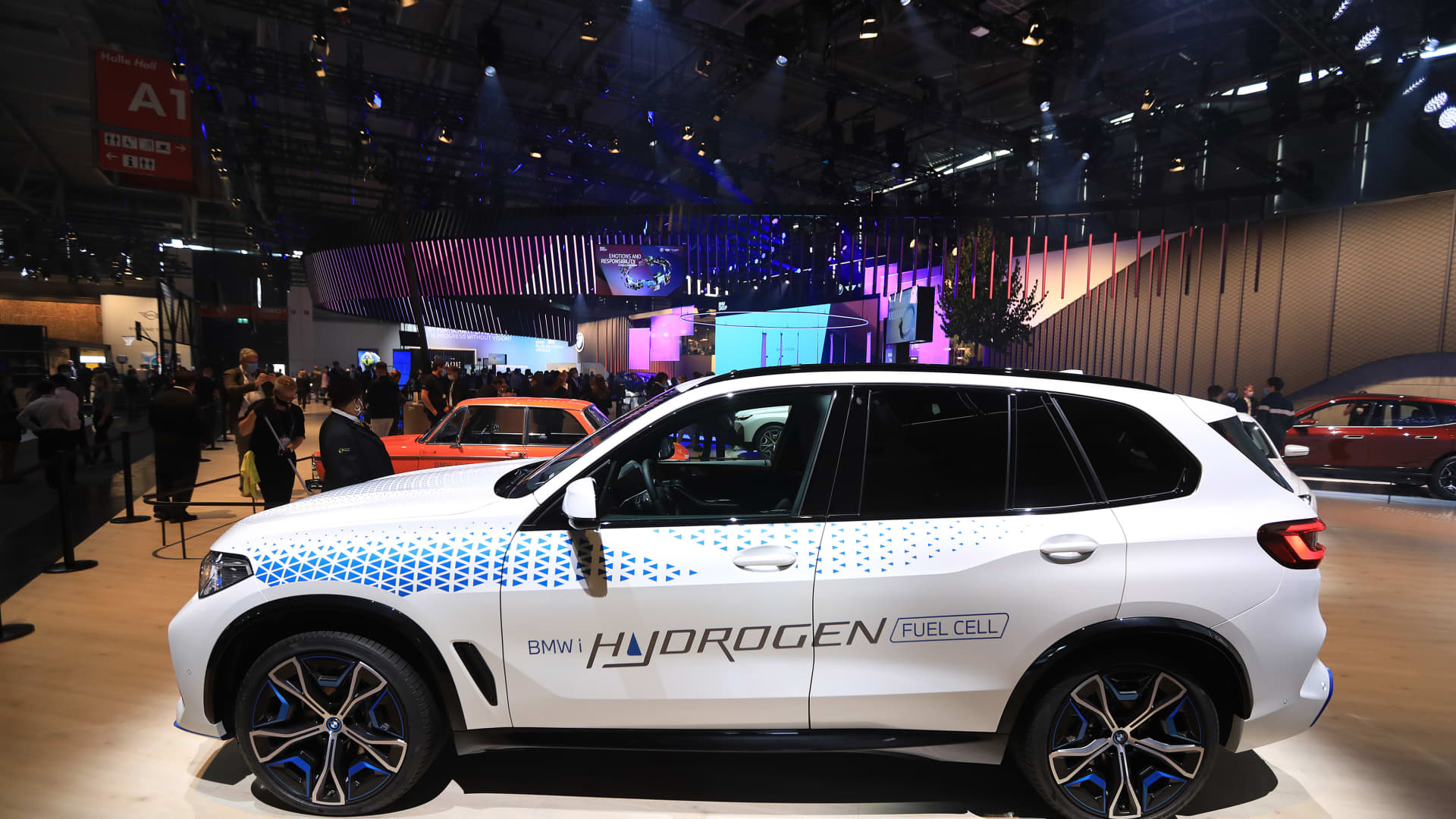The BMW Group on Monday launched a pilot fleet of hydrogen vehicles, with the German automotive giant’s CEO referring to hydrogen as “the missing piece in the jigsaw when it comes to emission-free mobility.”
The BMW iX5 Hydrogen, which uses fuel cells sourced from Toyota and has a top speed of more than 112 miles per hour, is being put together at a facility in Munich.
The car stores hydrogen in two tanks and can be filled up in three to four minutes. BMW says it has a range of 313 miles in the Worldwide Harmonised Light Vehicle Test Procedure, or WLTP cycle.
It will enter service in 2023, although the scale of the rollout is small, with a fleet of “under 100 vehicles” set to be “employed internationally for demonstration and trial purposes for various target groups.”
In a statement, BMW Chair Oliver Zipse said hydrogen was “a versatile energy source that has a key role to play in the energy transition process and therefore in climate protection.”
He went on to describe hydrogen as “one of the most efficient ways of storing and transporting renewable energies.”
“We should use this potential to also accelerate the transformation of the mobility sector,” Zipse added.
“Hydrogen is the missing piece in the jigsaw when it comes to emission-free mobility.”
“One technology on its own will not be enough to enable climate-neutral mobility worldwide.”
Described by the International Energy Agency as a “versatile energy carrier,” hydrogen has a variety of applications and can be deployed in sectors such as industry and transport.
BMW is one of several automotive firms continuing to look into the potential of hydrogen. Others include Toyota and Hyundai, while smaller businesses such as Riversimple are also working on hydrogen-powered cars.
Hydrogen may have its backers, but some high-profile figures from the automotive industry are not so sure.
In June 2020, Tesla CEO Elon Musk tweeted that “fuel cells = fool sells,” adding in July of that year: “hydrogen fool sells make no sense.”
In May 2022, Musk reiterated his skepticism about hydrogen’s role in the planned shift to a more sustainable future, describing it as “the most dumb thing I could possibly imagine for energy storage.”

ivermectin 6 mg over the counter – purchase atacand pill tegretol buy online
order generic isotretinoin 40mg – dexamethasone over the counter linezolid 600mg ca
buy zithromax 500mg online – generic azithromycin cost bystolic
order prednisolone 10mg online cheap – azipro medication buy progesterone 100mg online
buy cheap gabapentin – gabapentin without prescription sporanox 100 mg over the counter
order furosemide generic – buy betamethasone 20 gm generic3 betamethasone 20gm over the counter
order augmentin 625mg without prescription – ketoconazole 200mg without prescription oral cymbalta 40mg
Awesome post! Your style is very engaging and your opinions are very relevant. Thanks for sharing such useful information with us. Keep it up!
buy tizanidine 2mg without prescription – where to buy zanaflex without a prescription buy hydrochlorothiazide 25 mg online cheap
sildenafil citrate – us viagra sales tadalafil 40mg price
cialis 5mg for sale – tadalafil cost sildenafil 100mg pills for sale
cenforce 50mg pill – oral chloroquine 250mg order glycomet 500mg without prescription
order atorvastatin 80mg – zestril 10mg pills prinivil pills
medrol 16mg tablet – order pregabalin online cost triamcinolone 10mg
purchase desloratadine – clarinex 5mg usa order priligy 90mg pill
order cytotec without prescription – orlistat 120mg drug buy diltiazem 180mg
buy zovirax 800mg without prescription – allopurinol 100mg pills buy generic rosuvastatin 20mg
domperidone 10mg without prescription – buy sumycin 250mg online cyclobenzaprine 15mg brand
inderal price – propranolol price buy methotrexate cheap
coumadin order online – cheap warfarin hyzaar drug
esomeprazole for sale online – buy esomeprazole no prescription purchase sumatriptan generic
order levofloxacin 500mg sale – ranitidine 150mg price purchase ranitidine
buy meloxicam online – order celecoxib 100mg without prescription tamsulosin 0.4mg cheap
purchase valtrex pill – order fluconazole 200mg online cheap buy fluconazole generic
order provigil online cheap order provigil pill buy provigil 100mg online buy provigil generic modafinil online buy generic provigil 100mg modafinil pills